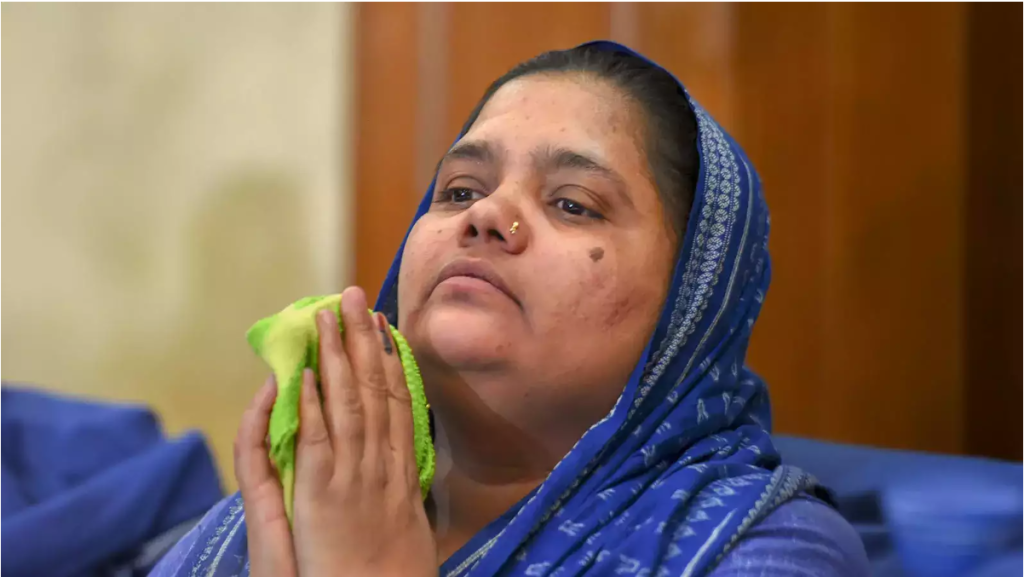Having served 14 years of a life term in jail, the convicts had asked for release on the ground of old age and ‘good behaviour’. How can ‘good conduct’ in jail compensate for the horrors wreaked on Bilkis and her family in 2002?
Hurrah for the Supreme Court! Hurrah for Bilkis Bano! All those concerned with human rights were delighted last week when the Supreme Court sent the 11 convicted rapist-killers of Bilkis Bano’s family in the 2002 Gujarat riots back to jail, and pulled up the Gujarat high court for granting remission.
Having served 14 years of a life term in jail, the convicts had asked for release on the ground of old age and ‘good behaviour’. Can good behaviour in jail compensate for their monstrous behaviour in 2002?
A pregnant Bilkis Bano was visiting her parents at the time. The killers included the family’s neighbours. Bilkis says, “One of them snatched my daughter from my lap and threw her on the ground, bashing her head into a rock.” She was gangraped. Her cousin, who had given birth two days earlier, was raped and killed, and her newborn baby was killed too.
The attackers murdered no less than 14 family members. Bilkis lost consciousness and was left for dead by the attackers, and that alone saved her life.
After her family’s massacre, Bilkis went to the police, but in the communally charged atmosphere of the time, they refused to go after her family’s killers. So, Bilkis approached the Supreme Court for justice. The court ordered a fresh probe by the Central Bureau of Investigation, which produced clear evidence of the guilt of the killers.
Because of the problems of the Gujarat justice system and threats to Bilkis, the Supreme Court transferred the case out of Gujarat to Maharashtra to ensure a fair hearing. The Maharashtra high court found the killers guilty and sentenced them to life. Many of us applauded.
Any petition for the early release of the killers should have been made to the Maharashtra high court that had jailed them. Instead, the convicts approached the Gujarat courts, that had earlier been deemed unfit to deliver justice. To widespread outrage, those courts released the 11 convicted killers. Even worse, the convicts’ release was celebrated, and they were garlanded and treated as heroes by local politicians. The anguish of Bilkis Bano was intense.
This columnist wrote a Swaminomics titled ‘Those deserving the noose should not be garlanded’. It noted that the quality of justice in India can be unpredictable, and sometimes evil triumphs and innocents languish in jail. “But are we so numbed by injustice that we are losing our capacity to feel horror?” the piece asked.
Fortunately, the Supreme Court has not lost its capacity to feel horror. It expressed astonishment that the Gujarat high court had not followed elementary process of law.
Since the sentence had been passed by the Maharashtra court, any early release should have been referred to the same court. The Supreme Court criticised the biases of the Gujarat justice system, and not for the first time.
In 2008, concerned by allegations of bias in the Gujarat police-justice system, the Supreme Court appointed an independent Special Investigation Team (SIT) to re-investigate nine major riot cases. The SIT cleared then chief minister Narendra Modi, while finding others at lower levels worthy of prosecution. Thousands of prosecutions followed.
However, critics said the SIT was not really independent since, besides its then chief RK Raghavan, half the members were from the Gujarat police.
The SIT found that one Gujarat minister, Maya Kodnani, was guilty of “instigating the mob” at Naroda Patiya. She was prosecuted, and a sessions court called her the “kingpin” of the riot.
She was found guilty and sentenced to a life term. However, she appealed to the Gujarat high court which acquitted her in 2018. She was also acquitted in a second riots case by the Ahmedabad special trial court last year.
With two acquittals, she may even re-enter politics. The Gujarat government has not appealed to the Supreme Court.
Every case of the 2002 riots cannot be shifted to other states. But surely the most prominent cases should be heard outside the state to ensure impartiality, as in the Bilkis case. Alternatively, they should be taken to the Supreme Court.
Another high-profile case is that of Sanjiv Bhatt, a senior Gujarat police officer. He filed an affidavit in the Supreme Court alleging that Gujarat police were told not to act against Hindu rioters in 2002. The Gujarat government suspended and prosecuted Bhatt for an old 1990 case of supervisory guilt in a custodial death case. He claimed he was being victimised. He was convicted in Gujarat by a lower court, and this was upheld by the Gujarat high court.
The Supreme Court should have the final say on both Bhatt and Kodnani.
This article was originally published by The Times of India on January 13, 2023.


